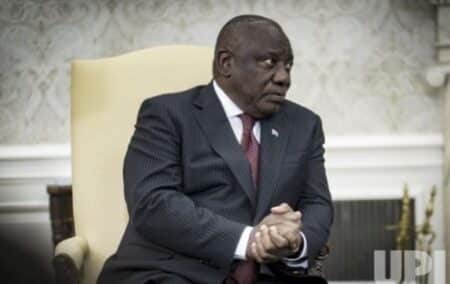Last week, Business Day ran an editorial entitled ‘Ramaphosa’s crisis of inertia’.
On the one hand, it claims that Ramaphosa has shown some unabashedly reformist impulses. He has pushed some important changes in the infrastructure field, such as making room for independent power generation, and private sector participation in Transnet’s logistics network.
Politically, he has done much more. ‘His biggest achievement,’ the editorial writes,’ of course, was to disrupt the state capture project.’ Some of the ANC’s mores destructive policies have been averted. Expropriation without Compensation ‘has stalled and is unlikely to see light of day.’
The problem, the editorial continues, is that he has not acted with sufficient vigour or resolve to deal with many of the problems confronting South Africa: crime, corruption, an ‘incredible tolerance for incompetence’. It goes on: ‘The worst, but valid, criticism of Ramaphosa’s emerging legacy is twofold: first, the inertia that hobbles decision-making; and, when decisions are made at last, implementation is parked. For example, even though it has been evident for years now that the urban e-tolling system is not working, no decision has been made to discontinue the system.’
These words probably resonated with many who welcomed the president’s ascendency, it bespoke a combination of admiration and disillusionment.
In fact, the reality of the present moment is if anything more dire than Business Day’s writer recognises. There has in fact been no relinquishing of EWC. The setback that it received at the end of 2021 related only to the amendment of Section 25 of the Constitution. This was significant, but not decisive.
There is some irony that the very week that the editorial appeared, the Portfolio Committee on Public Works and Infrastructure was deciding on the wording of the new Expropriation Bill. (Incidentally, on the day the editorial appeared, The Daily Friend published a piece by me raising concerns about this piece of legislation.) As it happens, the committee failed to conclude its work for reasons that remain obscure. The country has a temporary respite.
We at the Institute have warned that this is an intrinsic part of the EWC agenda. It enhances the discretion of the state to take property, skewing the process against the property-holder. Perhaps most importantly, it defines expropriation in a manner that would enable the state to take property without this being viewed as an act of expropriation – and thus not being eligible for payment.
This could enable a mass ‘custodial’ taking of land, a goal that has been affirmed by many in the country, including from within the government and the ANC.
Indeed, the President has himself has confirmed that EWC remains a party goal. At the ANC Policy Conference earlier this year he said that ‘despite the setback of our efforts to amend Section 25 of our Constitution we must continue to pursue all available options, including through legislation, like the Expropriation Bill, to implement the resolution of our 54th Conference on land redistribution without compensation.’ EWC, he added, was a tool ‘that we must utilize’.
So EWC remains very much a live issue, and a very real threat.
It might be even more notable that the President has stolidly defended its programme of party political control over non-partisan institutions: cadre deployment. This is despite the sad state of many our institutions, not least our municipalities; and despite that fact that the politicisation of these has been acknowledged even in official reports as being central to their failings. And despite the unambiguous condemnation of this practice by the Zondo Commission – lest it be forgotten, the extensive commission of enquiry into State Capture.
The Zondo Commission’s report made the point that it was not only illegal and unconstitutional (points the Institute has made for years), but that it was a contributory factor to State Capture. (Intriguingly, the ANC claimed to be unable to produce minutes of the meetings of its deployment committee for the period coinciding with the height of State Capture – during which President Ramaphosa chaired it.)
Cadre deployment was – again, as I’ve argued repeatedly – the original state capture. That it was perpetrated for the benefit of a political party with pretensions of being the country’s natural leader rather than for a foreign born trio and a domestic coterie around them, is a matter of detail not principle.
So, perhaps one State Capture project has been disrupted, but another continues.
This raises an uncomfortable question. If President Ramaphosa was the country’s likely redeemer – ‘the best we have’ as one prominent public commentator put it at an event I attended in 2019 – why is the country stuck in its malaise? Why are even some of the President’s putative achievements open to question?
The most plausible explanation is that Ramaphosa the Reformer was always more a construct than a reality, a genial character in our collective imagination rather than a statesman with consonant views.
The editorial quipped that Jacob Zuma had ‘left the bar so low that anyone with half a brain could have succeeded.’ One might credibly add, that with the bar so low, the mere promise of something better was probably quite enough to earn him the devotion and to inspire the optimism that he received. This applied no less to astute observers than to ordinary folk.
Yet the President has shown more continuity than discontinuity with what went before. Ultimately, his intention was never more than to restore the fortunes of the ruling party by correcting some of its excesses. When the editorial refers to the failures of implementation, it has hit upon something profoundly meaningful: implementation, not policy change, was President Ramaphosa’s offer.
What we are witnessing is nothing more the fulfilment of choices made. Destructive choices and counterintuitive choices, but choices made in service of the ruling party, and in respect of which no political imagination existed to do anything different.
Until that dynamic changes, we can expect more editorials like this.

